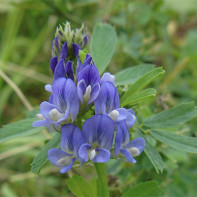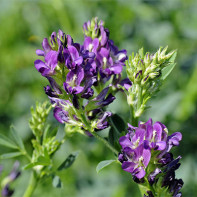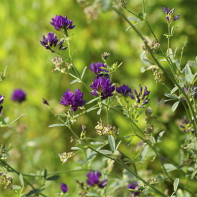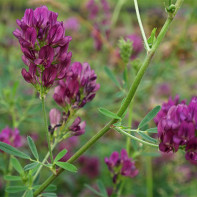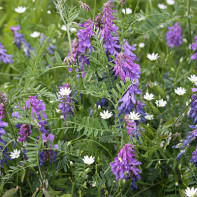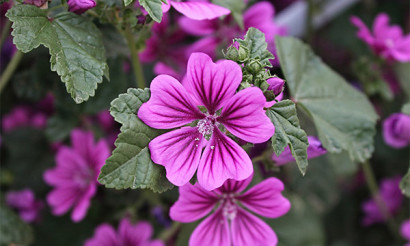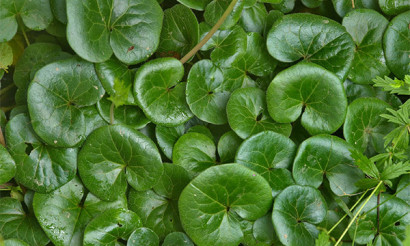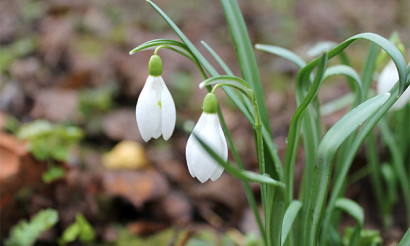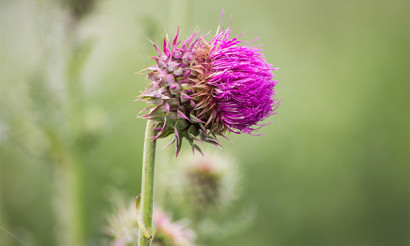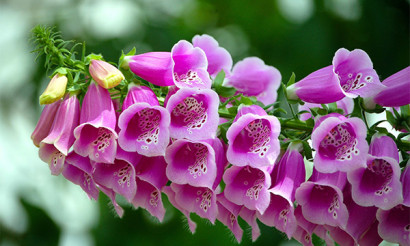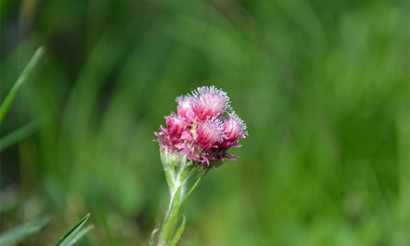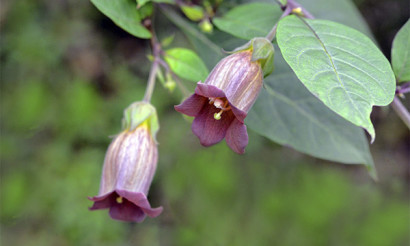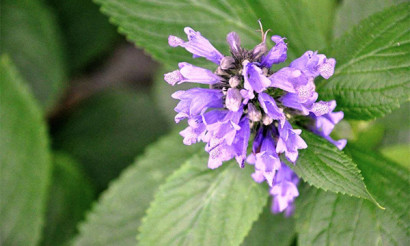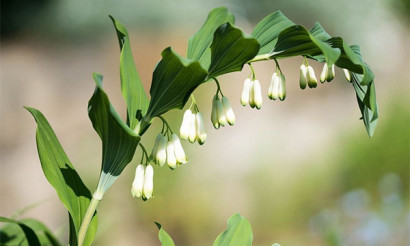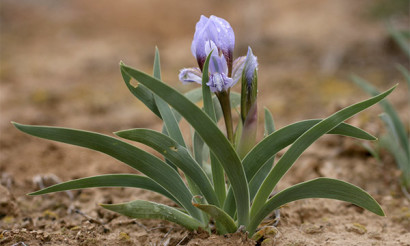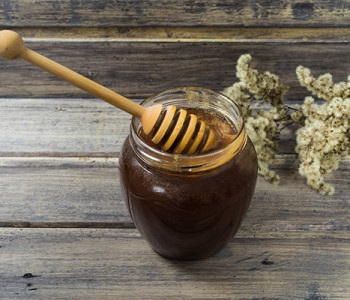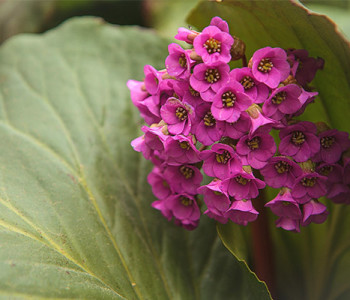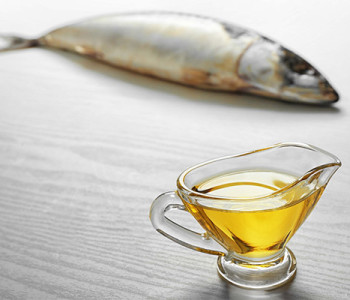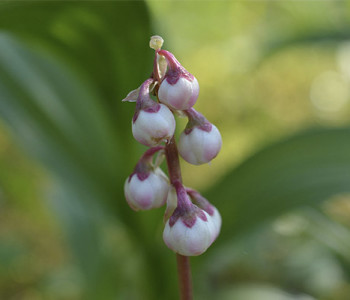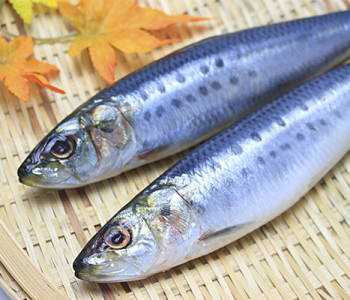Alfalfa: beneficial properties and contraindications
Alfalfa is a grass on whose branched stems sickle-shaped or spiral-shaped violet-lilac fruits grow. Sometimes in literature and on sites on the Internet you can find its other names: a medunka, a lechuha, or a goat. It belongs to the legume family and is often used for feeding livestock, in agriculture for making hay and silage. Ground fractions of alfalfa are added to flour. In addition, it contains a lot of vitamins and minerals that have a positive effect on human health. This article will acquaint readers and readers with the beneficial properties of this sowing grass, and also talk about contraindications that should never be forgotten when using alfalfa as a medicine.
- Chemical composition
- How it looks and where it grows
- Where does it meet
- Plant Overview
- Kinds
- Collection and storage
- Medicinal properties of alfalfa grass
- For women
- For men
- During pregnancy
- When breastfeeding
- For kids
- When losing weight
- Medicinal properties of alfalfa during stressful situations
- Why honey from alfalfa is useful
- The use of alfalfa in folk medicine
- With anemia
- With acne and skin diseases
- Slimming broth
- With diabetes
- For muscle and joint pain
- Skin Rejuvenator
- For healing wounds and cuts
- For lactation
- At menapause
- With hemorrhoids
- To strengthen the immune system
- To lower cholesterol
- Application in cosmetology
- Types of medicinal compounds with alfalfa
- Tincture
- Decoction
- Infusion
- How to grow alfalfa
- Is it possible to feed alfalfa rabbits and guinea pigs
- Contraindications
Chemical composition
Alfalfa contains a huge amount of minerals useful and necessary for the human body. Therefore, there is no doubt that this herb can be used as not only food for animals, but also a drug.
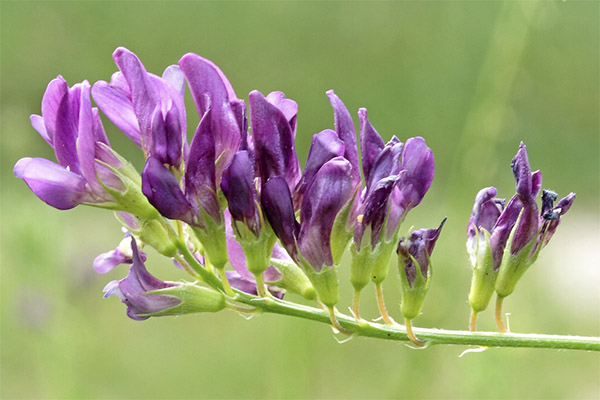
- Firstly, it’s Vitamin F (or else it is called omega-3 and omega-6 acid). It has an effect on improving the structure of the hair and strengthening the nail plate. Thanks to him, blood vessels become stronger. The use of vitamin F is also a good prevention for vision, increases the level of the female hormone estrogen.
- Secondly, it includes the so-called steroids. But these are not classical steroid substances that exist in the human understanding, but natural ones, or they are also called phytosteroids. They are much more useful and better than those that are consumed by all kinds of athletes who want to build muscle as quickly as possible.
- The chemical composition of alfalfa also includes carbohydrates, which are directly involved in the metabolism, and this is associated with the processes of energy metabolism in the body.
- There are so many oils in this sowing grass that are so good for the skin.
- Alfalfa contains very strong and effective antioxidants of natural origin.
- The grass is rich in natural female hormone, which copes with the restoration of hormonal balance in the fair sex.
- It contains ascorbic acid, which is familiar to everyone since childhood, which positively affects the restoration of immune cells in the human body.
- There is also an element in alfalfa that contributes to excellent skin regeneration. It is called tocopherol.
- The plant also contains such beneficial trace elements as fluorine, manganese, copper, zinc, selenium and iron.
From here we draw conclusions, based on the above useful components of alfalfa, that it can and should be taken in doses by a person in order to be healthy, strong and strong.
How it looks and where it grows
Where does it meet
Alfalfa from Latin is translated as “food from the Meat”. This place is located in Asia Minor, where this plant was first found.There were favorable climatic conditions, so a wild medunka quietly sprouted there, and then people learned to cultivate it. It is generally believed that alfalfa initially grew not only in Asia, but also in the mountains of the North Caucasus, in Iran. Ancient people knew how to cultivate it about 5 thousand years ago. Then it was brought to Ancient Greece, Rome and northern Africa. Later it spread throughout Europe, Australia, North and South America. Alfalfa is now very popular in the United States of America and India, as well as in Australia, where you can find the largest number of varieties of this very grass.
Plant Overview
Plant Overview
Alfalfa, as mentioned above, is a bean crop. It has a lot of species and subspecies, but in its original form it still grows in the Balkans, as well as in Russia.
So, what is alfalfa:
- This is a long-term sowing crop.
- The root system is very powerful and penetrates the soil to a depth of 10 meters.
- She has a straight stem, which can reach a height of 80 centimeters.
- Alfalfa has small leaves that grow throughout the bush.
- In August, brown fruits appear on it, which are similar to beans, then inflorescences of blue and blue flowers develop from them.
When alfalfa fully ripens, then part of the bush above the ground ceases to function. And only in the spring does it begin to bloom again.
Kinds
Alfalfa has more than a hundred varieties. This article will introduce some of them that are most common.
- Sowing alfalfa or blue. A typical representative of the legume family. Has a branched stalk, on which a bunch of small leaves. It reaches a length of 30 to 80 centimeters. Leaflets have the shape of an oblong ellipse. Inflorescences are distinguished by their violet-lilac color. Fruits of this type of alfalfa are usually in the period from June to September. It is necessary to collect such alfalfa when it blooms. It is during this period that it is harvested and dried for a long preservation of its beneficial properties. Grows near ponds, meadows, grassy slopes, in the steppes.
- Alfalfa field. This type of alfalfa can also be used as a medicine. It can be found both in the meadow illuminated by the sun, and in the shade. The soil is absolutely suitable for it, but still it gives its preference to dry soils. It looks almost the same as the seed, but the inflorescences can be bright yellow.
- Alfalfa sickle or yellow alfalfa. This is a plant that is a bush. This species has a rooted root system. There are a lot of stems, therefore, they form a small shrub that is completely covered with small wedge-shaped leaves. Inflorescences are yellow. Such grass grows mainly on the edges and meadow fields.
- Alfalfa is round. If all of the above species of alfalfa are perennial, then this plant blooms for only one year. The stem is not erect, but lying and weak. In length, it can reach 50 centimeters. Its flowering begins in the spring. It mainly grows on slopes with soil in which sand predominates, on the pebble beaches of water bodies.
- Alfalfa hop-like. This type of plant is also not a long-liver. The maximum life span reaches two years. The grass has a rooted root system. Stalks can be either erect and spread along the ground. In length reaches 50 centimeters. The leaves have a rhomboid or obovate shape, inflorescences are yellow in color. Basically, for this type of plant, meadow fields or steppes are needed.
- Alfalfa tree. This grass is a long-liver, the stem of which can reach two meters in length. The leaves are oblong and slightly serrated at the edges. A fairly dense inflorescence has a yellow or orange color. It is found in the rocky steppes.
Collection and storage
So, when we have already figured out when alfalfa basically begins to bloom, and this is the beginning of the summer period, we can begin to collect it. During the flowering period, the plants are saturated with their vitamins, so the medicinal properties double their effectiveness.
Collection and storage rules:
- It is best to collect grass in the morning. If this is done during the day, when the sun has sufficiently enriched the plant with chlorophyll, it loses some of its beneficial properties.
- The best time period for collecting seeds is August.
- Dry the collected grass in a place inaccessible to the sun and moisture.
- It is not necessary to collect an unripe or overripe plant.
- You can store already dried grass or its seeds for two years, then it loses its beneficial properties.
- The seeds that have sprouted live for six days. To store them you need a plastic container and a refrigerator.
- Only recently cut leaves and stems should be kept in a bag made of polyethylene. Store again in the refrigerator. They live only three days.
- Before proceeding with the preparation of decoctions and tinctures, you need to consult a doctor.
Medicinal properties of alfalfa grass
Alfalfa is not only good as a food for animals, but also widely used by people for medical purposes. It includes a wide range of different vitamins, minerals and trace elements that positively affect the work of all human organs:
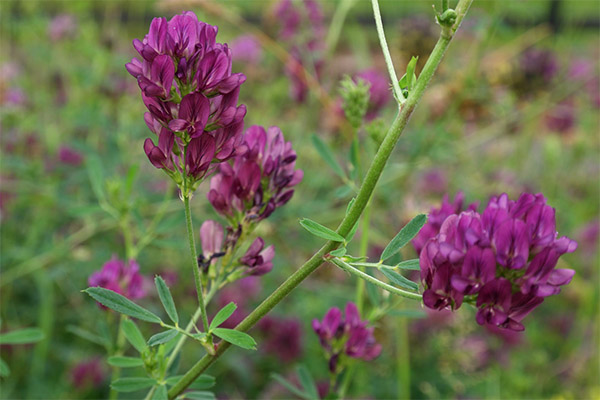
- Due to the fact that it contains omega-3 and omega 6 amino acids, alfalfa has a beneficial effect on the structure of the hair, the structure of the nail plate and its strengthening, eye health. Blood vessels become stronger, the level of the female hormone estrogen rises.
- Alfalfa contains a large amount of potassium and iron, which is good for the work of the cardiovascular system. Firstly, blood pressure is reduced. Iron, entering the body, improves the functioning of the circulatory system, because it promotes the growth of new red blood bodies. This affects the improvement of oxygen supply to all organs. These minerals prevent the risk of thrombosis, heart attack, angina pectoris and other heart diseases.
- Many scientists distinguish a large number of phytoestrogens in alfalfa, which are very valuable and useful micro compounds. Not only do they improve and stabilize the hormonal balance in the human body, but they are also a prophylactic against cancer. Natural compounds have beneficial effects on cells and prevent the risk of their mutations and the development of cancers.
- Alfalfa helps to remove unpleasant toxins, toxins, various carcinogens from the body, which damage the intestinal microflora, worsen metabolic processes and cause great harm to human health.
- Ascorbic acid or vitamin C contained in this plant helps to strengthen immunity, reduces the risk of colds and viral diseases.
- Alfalfa also has magical vitamin E, which affects the regeneration and rejuvenation of the skin, and also works to improve the process of energy metabolism. Also, vitamin has a good effect on the functioning of the genitals and reproductive functions.
- Alfalfa and its beneficial trace elements fight colds and viral diseases. Properly prepared tincture from this plant defeats cough, colds, tonsillitis. It activates the body's cells to fight the virus or infection.
- Decoctions of alfalfa leaves help with joint pain. Since they contain vitamins C and B, which contain a lot of calcium, iron and various antioxidants, they strengthen the immune system and relieve pain and inflammation in the joints.
- In alfalfa, there are so-called glycosides. These are compounds that fight the formation of cholesterol plaques that impair blood circulation. This prevents the risk of problems with the cardiovascular system, prevents the development of atherosclerosis and hypertension.
- In alfalfa, there are a lot of useful substances that improve digestion functions.If you consume the sprouts of this plant with food, you can forget about such problems as heartburn, flatulence, bloating, constipation, and diarrhea. In addition, the balance of microflora in the gastrointestinal tract is restored. The body is cleansed of toxins and toxins that interfere with normal digestion and poison the body.
- Alfalfa is used as a prophylactic for diabetes mellitus, as it affects lowering blood glucose levels.
- Alfalfa tincture with alcohol will help with cut problems. Thanks to its regenerating functions, alfalfa accelerates the healing and healing of wounds. In addition, it has antiseptic and antibacterial properties.
- Alfalfa contains a lot of protein compounds, it is recommended to take it to people who have suffered some serious diseases in order to restore the energy balance inside the body.
- Alfalfa is used in the fight against kidney diseases, such as cystitis and pyelonephritis. This plant has diuretic properties, so all unnecessary salts and fats are excreted from the body. Therefore, the plant contributes to the loss of extra pounds.
Trays with a decoction of alfalfa do an excellent job with hemorrhoids. Depending on the water temperature, the properties of the plant will change:
- a warm bath relieves itching;
- cool - reduces pain;
- hot - removes the inflammatory process.
For women
Alfalfa is rich in natural female hormone, which copes with the restoration of hormonal balance in the fair sex. In addition, due to its properties, skin cells are regenerated and rejuvenated, that is, you can maintain your youth for many, many years to come. During "these" days, it is also recommended to take alfalfa broth as an anesthetic. Again, thanks to the properties of restoring hormonal balance, you can take alfalfa decoction during menopause to stabilize and relieve stress that occurs inside the body.
For men
If a man drinks broth from alfalfa several times a week, he will forget about such a problem as prostatitis or impotence. With this tool, these types of diseases can be treated. It removes swelling and relieves pain during a trip to the toilet. Of course, alfalfa will help if you start taking it in time, at the initial stage. If the process is already running, then there is a risk of prostate cancer.
During pregnancy
Since a woman gives most of her vitamins to a child growing in her, then, of course, the body is exposed to a stressful situation. Expectant mother needs to replenish the mineral-vitamin balance. This can be done using alfalfa decoctions. Vitamin K, which is in alfalfa, has a good effect on fetal development and prevents bleeding.
When breastfeeding
Firstly, alfalfa enhances lactation, and secondly, it contains many vitamins that help strengthen the baby's immunity, and calcium, which has a beneficial effect on the development of small baby bones.
For kids
Newborn children who are not even a year old are advised to rub with a decoction of alfalfa. Older babies can be given 1 teaspoon of medicinal alfalfa to strengthen immunity and bones. But one must be wary of an allergic reaction. It is better to consult a doctor before giving your child alfalfa.
When losing weight
Alfalfa copes with its functions of establishing the digestive system and metabolism. It accelerates, so a person loses weight faster. A plus to this is that the broth from alfalfa is a diuretic, therefore, it quickly removes all unnecessary toxins and toxins, fats that poison the body, which helps to lose extra pounds.
Medicinal properties of alfalfa during stressful situations
To all other useful and healing properties of alfalfa, one can add a beneficial effect on the functioning of the nervous system.Thanks to the decoction of alfalfa, the body is energized, so it is much easier for him to cope with a stressful situation.
Why honey from alfalfa is useful
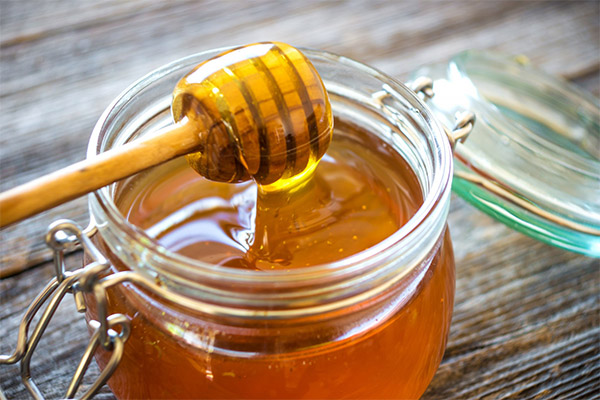
Honey is also made from this medicinal plant. The chemical composition of the grass is sugar, which is released at 13:00 and 16:00. Humidity should reach 50 percent, and the temperature outside is about 30 degrees Celsius. At this time, a family of bees should pollinate these plants so that an experienced person then collects delicious nectar.
Characteristics of alfalfa honey:
- It has a delicate and very soft texture;
- has a pleasant taste and aroma, light golden hue;
- about 40 percent of glucose is a part.
The healing qualities of such honey:
- The cardiovascular system feeds on a sufficiently large amount of glucose, which helps to lower blood pressure and strengthen blood vessels.
- During viral and colds, alfalfa honey will be an excellent antiviral agent. He will quickly reduce symptoms, and things will get better. Also, with a very strong cough, inflammation of the bronchi, exacerbation of asthmatic attacks, you can use honey to soften the throat, relieve swelling and inflammation.
- The beneficial properties of honey from alfalfa fight digestive problems and remove bile from the body.
Disadvantages of alfalfa honey
Despite all the positive and healing properties of alfalfa honey, it still has one drawback: it crystallizes very quickly, since it contains a large amount of sucrose.
Contraindications to the use of honey
Doctors recommend consuming a spoonful of honey every day, because it has beneficial properties. They say that there are no contraindications, since this product does not cause any allergic reaction and can not harm the state of the body.
The use of alfalfa in folk medicine
So, having determined that alfalfa is a healing and necessary plant for the body, having understood when to collect and how to store the collected grass, we must learn to make decoctions and tinctures correctly.
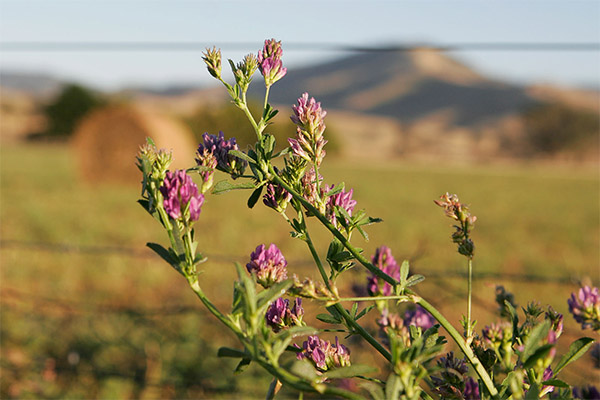
With anemia
Anemia is a disease when hemoglobin is not enough in the blood. In such cases, you can resort to medications from a pharmacy or make a decoction of alfalfa.
Alfalfa is considered an excellent tool for treating problems with anemia, anemia and other diseases associated with the circulatory system. So, you need to take a small pan and fill it with water (200 ml). Add a few alfalfa sprouts, then 1 teaspoon of horsetail and 0.5 tablespoon of green nettle. Cook the resulting mixture for 5 minutes. Then the resulting broth should cool slightly. After that, strain it. The medicine, which turned out in the end, must be taken after two hours from the end of the morning breakfast.
With acne and skin diseases
Alfalfa, as mentioned above, has regenerative properties, so a decoction of it will be an excellent remedy for various kinds of skin-related diseases.
You need to make a kind of cocktail. First rinse with 100 grams of oats and then put them on wet gauze. Tie it and hide it for a while in shade. Oat sprouts should germinate, and this approximately takes 2-3 days. Grind oats with a meat grinder, add 100 ml of pomegranate juice, alfalfa sprouts (about 10 grams), lemon juice of lemongrass berries (also about 10 ml) and half carrot juice. Add to this whole ground oats. The cocktail is ready. Take 2 tablespoons a day for 10 days, morning and evening.
Slimming broth
Due to its beneficial properties, alfalfa improves metabolism in the body, which reduces the feeling of constant hunger, that is, it makes it possible to get rid of overeating. To use alfalfa to lose weight, you need to drink a decoction. To do this, you need 200 grams of shoots of grass pour boiled water. Every day, drink about 200 ml of the resulting broth. You can also simply add plant sprouts to food or tea.
With diabetes
As mentioned above, alfalfa helps fight diabetes due to its ability to lower blood glucose.So, for a decoction you will need 100 grams of chopped and dried alfalfa and boiled water. Pour boiling water over the grass. Put the resulting mixture on fire and prepare a decoction using a water bath. This will take about 25-30 minutes. After time, let the broth infuse, and then use it several times in small doses. Just do not forget that you need to constantly monitor the state of sugar in the blood.
For muscle and joint pain
For the treatment you will need: 300 grams of dried alfalfa and half a liter of vodka. Mix all the ingredients. Such a medicinal decoction should be infused for at least 2 weeks. Store in a place protected from sunlight and in glass containers. When the broth is ready, then before each meal in a glass of water you need to add 10 drops of the product and drink it.
Skin Rejuvenator
Add half a glass of boiled water to half a glass of pre-dried alfalfa. Then add the resulting broth to the bathroom and soak in it for 20-30 minutes.
For healing wounds and cuts
You can attach the dried plant to the wound or make a decoction of alfalfa and apply cotton balls soaked in it to damage. This will contribute to the speedy healing and tightening of the wound.
For lactation
The beneficial properties of alfalfa enhance lactation in a woman’s body and saturate her milk with vitamins and microminerals, which perfectly affect the development of a newborn baby. You can add 0.5 tsp. dried herbs in a thermos while brewing green tea. You need to drink this drink in small doses every day so as not to cause an allergic reaction in the baby.
At menapause
For a decoction, you need to take 200 milliliters of water and 1 tablespoon of chopped alfalfa. Boil the resulting mixture for several minutes, then let it brew. In time, this may take 2-3 hours. Such a medicine should be drunk 3 times a day before each meal.
With hemorrhoids
To relieve inflammation, itching and unpleasant pain, you need to take baths with alfalfa extract. In a glass of boiling water, take 1 tablespoon of the crushed plant, which was previously dried. The broth should be infused for half an hour, and then it can be safely used for your own purposes.
To strengthen the immune system
You do not need to boil or insist. Simply take the young leaves, plucked from the plant, and add them to food, such as salad. This helps strengthen the immune system, restore the energy of an organism that has suffered a cold or some serious illness, and make the digestive system work without interruption.
To lower cholesterol
Thanks to the recipe, you can lower blood cholesterol and prevent the appearance of cholesterol plaques that adversely affect the circulatory system.
For this broth you need not dried grass, but fresh. It is necessary to collect the stems, from which subsequently squeeze the juice. This medicinal fluid should be drunk 2 tablespoons 3 times a day.
Application in cosmetology
Alfalfa is used not only in the treatment and prevention of any disease, but also for cosmetic purposes, as it contains vitamins, minerals, essential oils that contribute to the regeneration and rejuvenation of the skin. In addition, they also have a strengthening effect on the hair structure and nail plate.
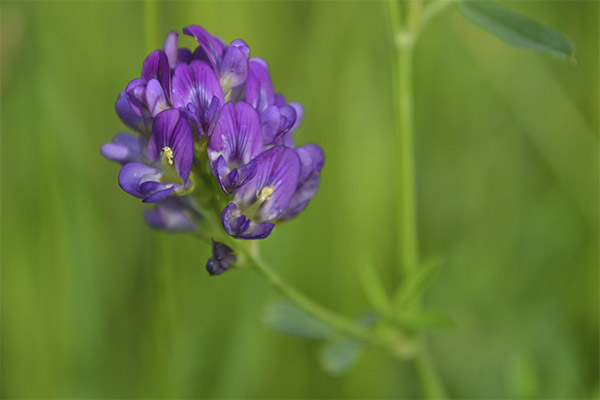
Alfalfa for cosmetic purposes should be consumed by people with the following problems:
- skin diseases, acne;
- dry skin;
- inflammation that occurs on the skin;
- rash and any kind of rash;
- regeneration of the skin in place of scars and scars;
- hair loss and lack of vitamins in hair follicles;
- peeling, especially of the scalp.
With alfalfa extract, you can make various kinds of masks:
- For this, fresh alfalfa sprouts, ground to a powdery state, will be needed. They need to pour boiling water. Cool the resulting mixture and let it brew. Then apply it with massage movements on the skin of the face and neck. Allow the tincture to soak into the skin and after 15-20 minutes, rinse with water of moderate temperature. After the procedure, moisturize the skin with cream. Apply this mask in the morning and evening for a week to achieve the best result.
- This is a recipe for a mask with a rejuvenating effect. Suitable for all those who want to keep fresh and youthful skin for a long time. Pour 1 teaspoon of alfalfa juice into a small container, then plain water and honey. Mix all this thoroughly and apply on face. With such a mask, walk for at least 20 minutes, and then rinse with warm water. The course of application is to repeat this procedure every 2 days 10 times.
- This mask has a calming effect, removes redness and reduces inflammation. Add 50 ml of boiled water to 50 grams of ground alfalfa powder. Add honey to this mixture. Mix all the ingredients thoroughly and transfer to a gauze dressing, which is then applied to the problem area of the skin for 10-15 minutes. After this procedure, remove the mask with a damp cotton pad. It is also recommended to wash this infusion in the morning, after sleep, in order to preserve the youth of the skin and prolong the appearance of the first unwanted wrinkles.
Recipes with the addition of alfalfa for hair care:
- This recipe is recommended for people who suffer from hair loss. You need to prepare a decoction of 20 grams of a dried plant and add half a liter of boiling water. Wait until the broth cools, insist. Then strain it and rinse his hair. It is recommended to do this several days a week (regardless of whether you wash your hair that day or not). The hair not only stops falling out, but also becomes soft and easy to comb.
- This recipe is suitable for people with gray hair. You can stop this process using alfalfa juice with the addition of carrot juice and lettuce. Also, the addition of alfalfa sprouts to the food helps to strengthen the hair roots.
This plant also strengthens the nail plate due to its amino acid content. Just adding the seeds of this miraculous plant to the main food or tea will help keep your nails strong and prevent the risk of brittleness and delamination.
Types of medicinal compounds with alfalfa
Tincture
- Alfalfa needs to be ground so that it turns into a powdery state. Pour it into a glass filled with boiling water. Then let it brew and cool. Drink the resulting tincture several times a day for a week and a half.
- Alfalfa leaves need to be chopped and add to them half a liter of alcohol or vodka. Leave this tincture for 2 weeks, so that it is well insisted. Method of application: drink a glass of water, in which add 10 drops of the resulting solution in advance.
Decoction
- To make a decoction, you need to pour half a liter of water into a saucepan and throw 100 grams of dried grass there. Then boil for several minutes and then let the broth cool down a bit. The resulting solution can be used for douching.
- If there is a problem with the nervous system, then you can make a decoction: add 400 grams of water to 400 ml of water. Put on fire and cook for 15–20 minutes. Then the broth should cool and infuse. Method of application: 3 times a day, 100 ml of decoction at room temperature.
- To make alfalfa juice, you need to grind the young, freshly picked leaves of the plant and, laying them on a towel, and preferably on cheesecloth, squeeze the juice out of them.Then add boiling water to the juice in a one to one ratio. Such a decoction should be consumed in the morning half an hour before breakfast.
Infusion
It is necessary to grind alfalfa into powder, and then add boiled water to it. Cool the infusion and take small doses before each meal.
How to grow alfalfa
Alfalfa is a particularly unpretentious plant, so it can be grown calmly and without unnecessary troubles on a regular summer cottage.
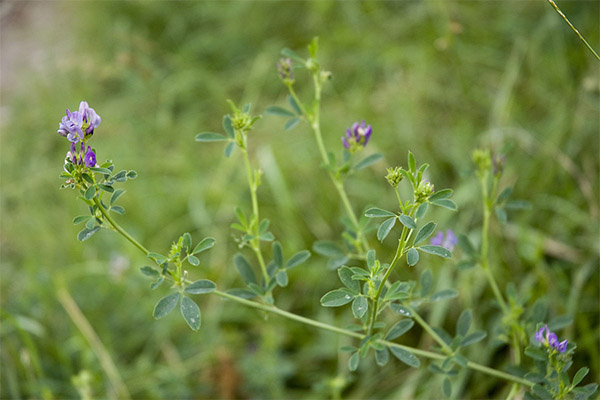
The first thing to do before sowing is to clear the area of any weed grass, loosen the soil. First spread the seeds on a towel and expose them to the sun. Soil should be combined and enriched with all sorts of useful enzymes. It is necessary in advance to prepare a container with soil, plant seeds of plants, and then water them as necessary.
Alfalfa can be grown even in a glass jar. You need to soak the seeds in a jar. In the morning, rinse them and transfer to a clean container. Put the jar sideways so that the sun's rays warm the seeds well. Rinse them several times a day. In a week, the first green sprouts will appear. But you can use them only after washing. The refrigerator is the best place to store alfalfa sprouts that need to be wrapped in a fabric of dense material. The shelf life of such sprouts is only 7 days, after which they lose their beneficial properties and become unsuitable for human consumption.
Is it possible to feed alfalfa rabbits and guinea pigs
In agriculture, alfalfa is often used as livestock for livestock. Through it, animals receive many useful vitamins and minerals, which improves their internal condition. But for small pets like guinea pigs and rabbits?
For "eared" alfalfa is a real storehouse of vitamins to enhance their health. It is the most essential component of rabbit food. Very often alfalfa is added to the diet of little rabbits and females who feed their babies milk. Useful enzymes affect the functioning of the circulatory system, increase the amount of milk in the nursing rabbit. In addition, as we already know, this plant improves the functioning of the digestive organs, cleanses the gastrointestinal tract, and promotes a good metabolism.
For male rabbits, alfalfa sprouts give 3 weeks before the "date" with the rabbit. The use of alfalfa by rabbits makes them strong: muscle mass builds up faster, bones become strong. But you do not need to stuff small rabbits with a lot of alfalfa. A stomach unaccustomed to such food can acutely react with painful sensations. Therefore, they need to be trained with caution and gradually.
Guinea pigs also need micronutrients in alfalfa, especially females waiting for offspring and newborns.
But there are some contraindications that should be considered so as not to harm our smaller brothers. Adult animals should not be given too much of this herb. Its chemical composition contains calcium, which, when ingested in an adult, flushes out useful trace elements, which can lead to diseases of rabbits and pigs.
Contraindications
- Alfalfa should not be added to food for those who suffer from a disease such as lupus erythematosus.
- If a person has problems with blood coagulation, and he takes special medications, then the use of alfalfa, in which a large amount of vitamin K, will reset the entire treatment process. Medicines will no longer give their effect.
- If a person has an allergic reaction to legumes, then do not risk it with alfalfa.
In any case, before you start using this plant, you need to consult a doctor.
Summing up all of the above, it must be said that alfalfa is indeed a miraculous natural medicine that should be included in the diet of every person, except for those for whom it is contraindicated for medical reasons. No need, of course, to overdo it. Several times a year, it is necessary to arrange such preventive measures in order to prevent the development of many diseases and strengthen their own health.
«Important: all information on the site is provided exclusively in fact-finding purposes. Before applying any recommendations, consult with a profile specialist. Neither the editors nor the authors are liable for any possible harm caused materials. "

